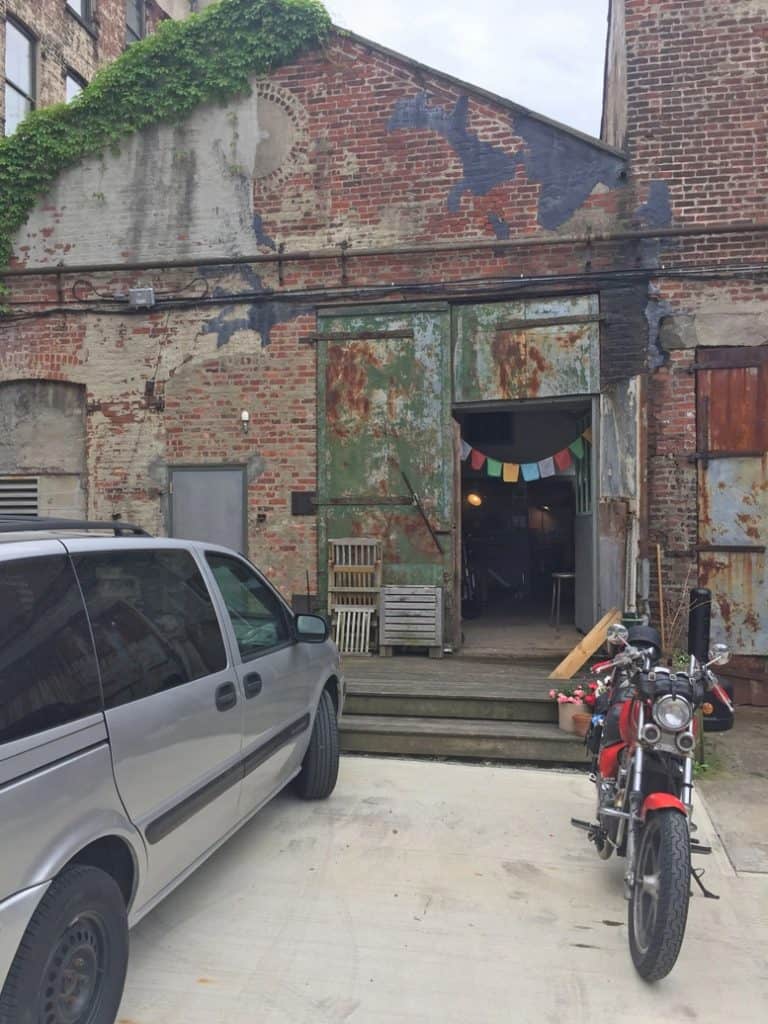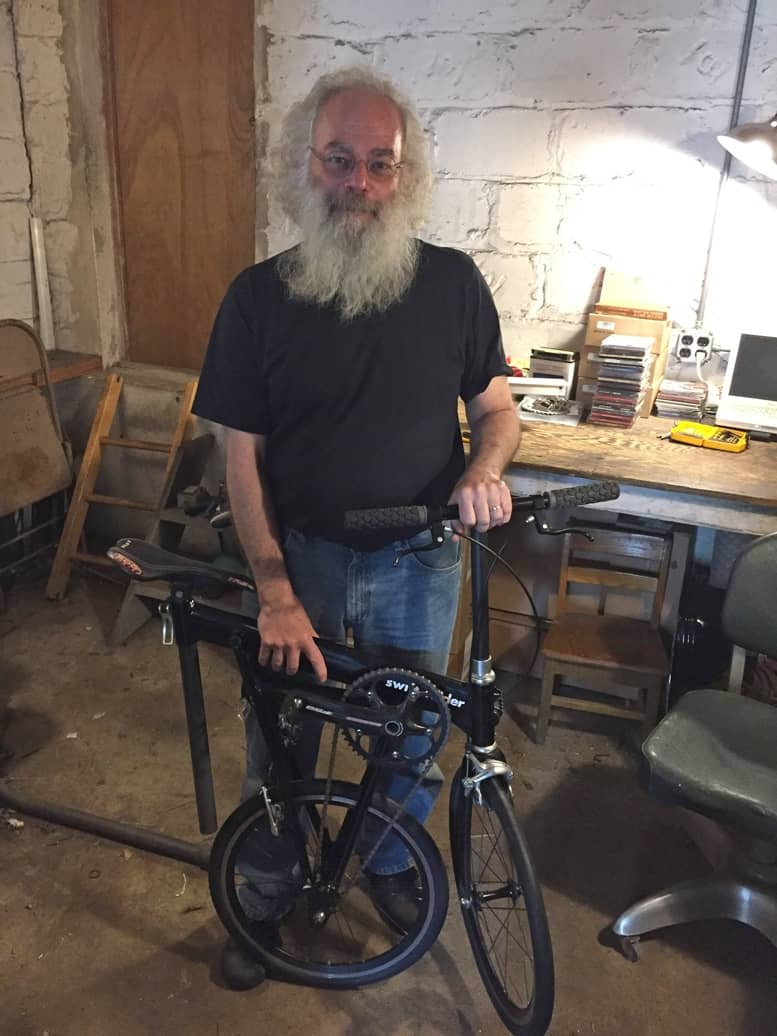Since 1996, the Swift Folder – the internationally renowned folding bicycle – has assisted New Yorkers whose complicated commutes typically feature some combination of walk-up apartments, crowded trains, office elevators, and city streets. How many of them know that its inventor lives and works in Gowanus?
At the time, industrial designer Peter Reich wasn’t much of a cyclist. “I grew up in the suburbs of New Jersey. My father was horrified by the idea of any child of his riding on the street, so I didn’t even learn to ride a bike until I was 18,” he recalled.
A Pratt Institute grad, he came across a cheap loft in Gowanus in 1983, which he rented as commercial space but used as an under-the-radar residence with his wife, an artist. Two years later, he got his hands on a small workshop on the other side of the industrial complex’s courtyard, which became the headquarters of his company Design Mobility, Inc. Both spaces still belong to him.
He’d always had an interest in lightweight, portable designs that didn’t take up much space. In 1980, the movie Altered States popularized sensory deprivation tanks as a form of alternative medicine; floatation centers charged for sessions by the hour. Reich built “a do-it-yourself, easy-to-build, easy-to-store floatation tank” for private use that could be assembled and disassembled in an apartment.
He’d also worked on devices for people with disabilities, including a wheelchair-accessible taxi. The disability rights advocate Curtis Brewer, a quadriplegic, hired him to design a foldable patient lift (a device that transfers people with limited mobility from chairs to beds) that he could store in a closet. “It wouldn’t be a piece of hardware cluttering up the room, making it obvious that there was something different about this guy,” Reich described.
In the early ‘90s, the bicycle designer George Bliss connected Reich to the cycling activist Jan VanderTuin, who had recently moved to Eugene, Oregon. On a trip to the West Coast, Reich met up with VanderTuin, and the two formed an idea to create a folding bicycle. Back home, Reich drew up plans, and VanderTuin turned the drawings into bikes. After three years and seven prototypes, Bliss sold the first Swift Folder at the Hub Station, his store in Manhattan.
Before getting into the bike business, Reich had, out of curiosity, already bought a Moulton – the first mass-produced, collapsible, small-wheeled bicycle, circa 1962 – at a yard sale in the Carolinas. He also owned a Dahon, which remains a major player in the folding bicycle industry.
“This’ll sound horribly egotistical, but there was nothing as good as a Swift,” Reich bragged. Most of the folding bikes that rode relatively nicely, like Bike Friday’s, were suitcase-friendly touring bikes for travelers, designed to be unfolded and refolded once over the course of a weekend trip. The existing commuter bikes that folded quickly were not “confidence-inspiring.”
While its heavier competitors featured “a big hinge-plate right in the middle” of the frame, the Swift used a releasable seat-post to collapse its frame. Undo two clamps, and ten seconds later, the size of the bike is halved.
After a write-up in New York Magazine, sales picked up, and VanderTuin could no longer meet demand. Reich found a factory in New Jersey that could manufacture 50 bikes in a single go. Then, at a conference in Philadelphia, Reich met brothers Karl and Nathan Ulrich of Xootr, and a partnership emerged. Reich called it “a match made in heaven.” Xootr contracted a factory in Taiwan to manufacture an aluminum version of the previously steel Folder, shipping containers of 400 frames at a time.

One such container made its way to Reich, who still uses the frames to create custom-built Folders in Gowanus for customers who may want specific components that differ from those that come with the standardized version. Xootr charged about $800 for the mass-produced Folder; for his custom bikes, Reich prefers not to charge much more than that, but a loyal customer once asked him for a tricked-out Folder that, due to its top-of-the-line components, ended up costing $5,000. Reich put it together reluctantly.
According to Reich, the aluminum iteration of the Folder is lighter than the steel, and he “can’t tell the difference” in the ride. In either case, it’s “an incredibly overbuilt, stiff frame. Steel’s supposed to be supple, but if it was supple, it would’ve broken because it’s not triangulated the way a regular frame is.”
Xootr stopped production of the Folder in 2018. “They knew it was time to do something different because they’d been making exactly the same bike for 12 years, and people get bored,” Reich explained.
In New York, Citi Bike had swallowed some of the customer base for folding bikes. Meanwhile, Brompton Bikes, a larger folding bicycle operation, “had sort of flooded the market.”
A folded Brompton is smaller than a folded Swift, but while the former must be carried, the latter can be rolled. “I use 20-inch wheels; Brompton always uses 16-inch,” Reich clarified. “The whole idea with the Swift was basically to make it as large as possible while still staying in your personal space – to not compromise it for the fold, to use as many standard parts as possible. 20-inch wheels are all over the place; BMX bikes use them. Any bike shop has the tube.”
Both Brompton and Dahon “have their own saddles, their own stems, their own handlebars, everything that could tailor the bike to you – you’re stuck with their stuff. Swifts will accept whatever comes down the pike.”
By email (swiftfolders@gmail.com), Reich still takes orders for custom-built Swift Folders, but he has only 17 frames left of the original 400. “It’s really the end of an era,” he sighed. “You tell your readers that if they want an heirloom-quality bike in limited supply, if they act now, they can still get one.”
Reich hasn’t necessarily given up on bikes for the future, though – recently, he drew up a design for a titanium Swift. “As we speak, somewhere deep in mainland China, Titan Industries is working on a prototype for a new frame for me,” he divulged.
He worries, however, that the titanium Swift will cost too much: “This was always supposed to be a practical, everyday bike.” He also feels that, “given that Brompton and Dahon are all over nowadays, it’s not like I have to worry about making folding bikes for the world anymore.”
If he retires from the bike business, Reich will work on some of his other ideas – an ultralight, three-wheeled, electric car; a wheelchair-accessible pedicab – as long as he has a place to work on them. Despite the upcoming Gowanus rezoning, his loft on Nevins Street (now a legitimate residence) appears to be safe – the new landlord plans to update the building rather than tear it down – but his studio behind the National Packing Box Company factory could easily disappear. And as he tries to imagine what Gowanus will look like after gentrification, he’s not fully sure that he and his wife will want to stay anyway.
“We’ve been really lucky to have found unwanted industrial space,” he acknowledged. “And how long would anyone expect unwanted industrial space in Brooklyn to stay unwanted? It’s been affordable, and the only reason we have it is that industry changed, and industry left. I’m sure, push comes to shove, there’s industry dying somewhere else.”










2 Comments
Pingback: Monday’s Headlines: E-Scooter Day in Albany Edition – Streetsblog New York City
Pingback: Monday's Headlines: E-Scooter Day in Albany Edition | News for New Yorkers